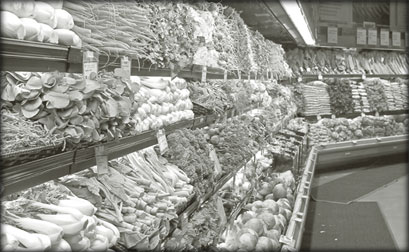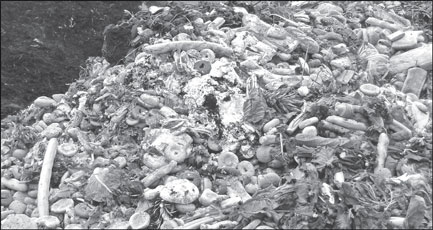|
Food waste:
We are the problem and the solution
By Lionel Wijesiri
Here in Sri Lanka, we waste a shameful amount of food. The writer has
seen estimates that Sri Lankans waste about 30 percent of the food that
we produce. While some of that waste happens during processing, in
restaurants, and even on the farm, the part that we as individuals can
control is how much food we personally waste.
Wasted food is wasted money, and whatís worse is that the food waste
that we send to landfills breaks down to produce methane, a greenhouse
gas thatís far more harmful than carbon dioxide. Luckily, from your
shopping cart or bag to your kitchen and even when youíre eating out,
there are ways that you can waste less food to save money and protect
the planet.
 |
|
Impulsive buying is not advisable in
the case of vegetables, fruits and fresh fish and meat |
There are a number of benefits of reducing the amount of wasted food.
It saves you money, from buying less food. It reduces methane emissions
from landfills and lowers your carbon footprint. It conserves energy and
resources, preventing pollution involved in the growing, manufacturing,
transporting and selling of food (not to mention hauling the food waste
and then land-filling it). It also supports your community by providing
donated untouched food that would have otherwise gone to waste to those
who might not have a steady food supply.
Guidelines
A few simple guidelines can help you save money and cut down on the
amount of food thatís wasted at home. Unless youíre a kitchen ninja that
can plan and measure out the exact portions for every meal you make,
itís likely you find yourself wasting good food because you didnít plan
right, you forgot about it, or you just had no idea what to do with it.
Thankfully, itís not too difficult to cut down on your kitchen waste.
Whether youíre cooking for 10 or for one, wasting food in the kitchen
is easy no matter how strictly you plan everything. Of course, planning
is the first and most important part, but if youíre no good at that,
there are tips for organising your refrigerator and finding alternatives
for food which are on their way out. Letís start with the ever-important
plan.
Shop wisely
Much of the food wastage in our kitchens is a result of simply buying
too much or inadequate planning. To reduce the amount you throw away,
check whatís in your fridge before you go shopping and plan your next
meal around what needs to be eaten. Donít forget to look at the back of
the shelves and in those hidden corners. Put things in the freezer if
you wonít be eating them soon.
Before you go shopping, think about what you will eat for the next
few days and make a list of what you need. This will help you buy only
what you need - minimising food waste and saving you money. Buy in
quantities that you will use.
Keep a store of long-life basics in your cupboard such as pasta,
rice, tinned fish or beans or frozen vegetables. This makes it easy to
prepare a quick meal when you add a few fresh ingredients.
Store food correctly
Different foods have different storage needs. Correct food storage
has a huge impact on the freshness and shelf-life of food. Keep your
food fresh and avoid wasting energy by having your refrigerator set at
the right temperature.
Keep a range of air-tight plastic containers for storing various
foods once they have been opened or cooked. Keep old margarine and
takeaway food containers including their lids for this purpose.
Air-tight jars (ex. jam jars) are great for storing dry ingredients such
as flour, rice or leftover liquids.
Here are some tips for storing food:
* Most vegetables keep best in the refrigerator - in the vegetable
keeper if you have one. Once cut, vegetables are best stored in the
fridge.
* Remove vegetables, herbs and mushrooms from plastic bags as they
will Ďsweatí and spoil.
* Store potatoes, onions and other root vegetables in a cool dry
place. If your potatoes turn green, donít eat them - put them in your
compost or worm farm.
* Refrigerate raw meat immediately after purchase until itís cooked.
Keep meat in a sealed container so it doesnít contaminate other food.
Store it in the coldest part of your fridge (usually next to the coils).
* Store opened pasta, rice and cereals and other dry ingredients in
air-tight plastic containers.
Cook only what you need
Try to cook only as much as will be eaten. A portion guide may help
you to work out how much to cook for each person. If you have extras
every night, adjust the amount you cook.
Use leftovers
Get inventive with leftovers and put even small amounts of leftovers
in the fridge or freezer for a handy lunch or snack. There are plenty of
websites with new and traditional recipes that make use of leftovers to
provide nutritious and delicious meals. Keep leftovers for lunches or
snacks, or as part of another meal. If you canít use leftovers straight
away, freeze them for later. Donít reheat leftover food more than once.
 |
|
With food waste forming over 25
percent of solid wastes, it is time to take a fresh look at
its disposal |
Be creative and invent your own recipes from whatís in the fridge.
You can search for recipes online by key ingredients. Keep scraps for
pets. Make sure the food is suitable - for example, onions are toxic to
dogs. Chickens will dine on a variety of kitchen scraps. Theyíll also
provide fresh eggs, pest control and garden services.
Compost food scraps
You can turn food scraps into compost for your garden to reduce waste
and return nutrients to your soil. You can compost most types of food
waste including uncooked vegetables and scraps, fruit, salad, crushed
egg shells and coffee grounds. It is not recommended that you put the
following items in your compost as they do not break down quickly and
can attract animals or vermin; dairy products, meat or fish, lemon or
orange peels.Keep a small container for food scraps handy in your
kitchen and empty it regularly into your compost bin. Cut up large
pieces of food scraps as they will break down more quickly.
Grow your own food
Growing your own fruit and vegetables is a great way of reducing some
of the harmful gases produced by processing and transporting food. Not
only is growing your own food rewarding - it tastes better too. Even if
you donít have a garden, itís easy to grow a few fresh herbs or salad
greens in a pot on your verandah or kitchen so theyíre always on hand.
Instead of buying costly bunches of herbs at the supermarket that you
may not use, you can snip off just a few leaves as you need them. The
flavour of fresh herbs will give your meals a lift.
Food is a precious commodity, but it is not always treated that way
in Sri Lanka. Simple lifestyle changes, such as keeping track of
leftovers, recycling waste as compost and donating your surplus to the
needy can have profound effects. We are already making progress in
reducing food waste, but we need more of this type of initiatives if we
are to significantly decrease the millions of tons of food that are
thrown away each year.
Half of world food production wasted
A new report by the Institution of Mechanical Engineers, UK has found
that as much as 50 percent of all food produced around the world never
reaches a human stomach due to issues as varied as inadequate
infrastructure and storage facilities through to overly strict sell-by
dates, buy-one-get-one free offers and consumers demanding cosmetically
perfect food.
With UN predictions that there could be about an extra three billion
people to feed by the end of the century and increasing pressure on the
resources needed to produce food, including land, water and energy, the
Institution is calling for urgent action to tackle this waste.
The report ĎGlobal Food Waste Not Want Notí found that:
* Between 30 percent and 50 percent or 1.2-2 billion tonnes of food
produced around the world each year never reaches a human stomach;
* As much as 30 percent of UK vegetable crops are not harvested due
to them failing to meet exacting standards based on their physical
appearance, while up to half of the food thatís bought in Europe and the
USA is thrown away by the consumer;
* About 550 billion m3 of water is wasted globally in growing crops
that never reach the consumer;
* It takes 20-50 times the amount of water to produce a kilogram of
meat than a kilogram of vegetables;
* The demand for water in food production could reach 10-13 trillion
m3 a year by 2050. This is 2.5 to 3.5 times greater than the total human
use of fresh water today and could lead to more dangerous water
shortages around the world;
* There is the potential to provide 60-100 percent more food by
eliminating losses and waste while at the same time freeing up land,
energy and water resources. |


